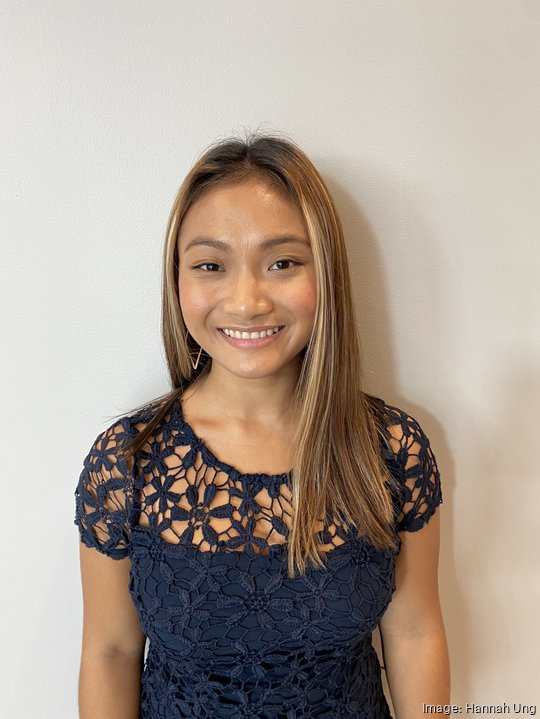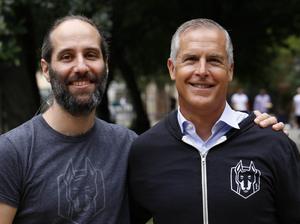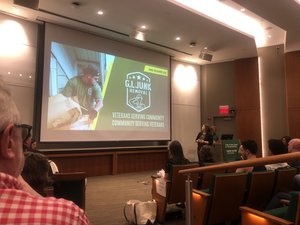
A first-generation Northeastern student has created a startup inspired by her love of solo travel.
When Hannah Ung was 18, she decided to take a trip before she started college and visited Japan, Singapore and Cambodia. But as she tried to make the most of her visit and bounced around between multiple cities, she struggled to cart around her luggage. It was a problem she continued to encounter as she traveled over the next few years.
“As I traveled more and more, I just had this epiphany when I was in Spain. I was leaving my Airbnb house, and I literally said to myself, ‘Why doesn’t Airbnb for suitcases exist?’” Ung said.
During her time at Northeastern, Ung has built this idea into a business. While the audience for the business has shifted over time, the goal of helping people find more affordable, short-term storage options has remained.
Ung officially launched her startup Boxy this month. The company’s goal is to connect residents and the real estate community who have extra space in their apartments or buildings to college students in need of storage on an hourly, daily and monthly basis.
Originally from Rhode Island, Ung is now completing her fifth year at Northeastern University studying brand management and entrepreneurship. She was named a member of BostInno’s 25 under 25 honorees in 2022. Ung was also a spring 2022 Husky Startup Challenge finalist, a venture co-op at The Sherman Center and a 2022 Women Who Empower Awards 2nd place recipient.
Ung saw an opportunity to serve college students because of Boston’s large student population and the lack of flexible storage options in the city. She said most storage starts by charging on a monthly basis, which is not flexible for people looking to store items for a few days or a few hours. For example, a college student who must move out of their apartment on August 31 before starting a new lease on September 1 wouldn’t want to pay for a month of storage when they only need a day.
“With Boxy, it’s very nearby, affordable, convenient and community-based,” Ung said.
On Boxy’s website, “stashers” (what the company calls its customers) can see storage options listed by local residents. The listings include details like the type of items they store, ratings, proximity to local colleges and photos of the storage space.
The stasher then requests a quote based on their storage needs. On the back end, Ung reviews these requests and provides quotes manually. If they accept, Ung then connects the stasher and host.
Ung said they take information from the host such as their full name and a copy of their government ID. She also visits or Facetimes with the host to see the storage space.
Boxy also offers insurance options for stashers and hosts. The host protection plan is provided at no cost and covers things like theft due to forcible entry, fires, water damage from leaks, and vermin damage. Stashers can pay $5.99 per month for coverage up to $500 in certain instances.
Ung said stashers usually pay between $70 to $90 to store about six boxes per month. It would cost around $100 to $150 for boxes and furniture, such as a mattress and desk.
Boxy is targeting Northeastern, Boston University, MIT, Brown University and RISD for its launch. The company has already completed two pilots.
“What we’re doing right now is we pretty much go to different college campuses, pass out flyers, reach out to student orgs like frats and sororities, try to get connected with the international student organizations,” Ung said.
The startup has raised over $30,000 to date from grants and pitch competitions. Boxy is also running a crowdfunding campaign to raise $10,000.
After graduating from Northeastern in May, Ung plans to work on Boxy full time.
She said one of her goals for the year ahead is bringing on more hosts and stashers. She also wants to connect with members of the real estate community to help them use empty property space as a storage option.
“I would say try to get as much traction as I can while keeping the burn rate low,” Ung said. “And then after that, I’ll see and evaluate how much we should raise in the future. But I’m not in a rush while I’m trying to find product market fit and getting traction.”
Sign up for The Beat, BostInno’s free daily innovation newsletter from BostInno reporter Hannah Green. See past examples here.








